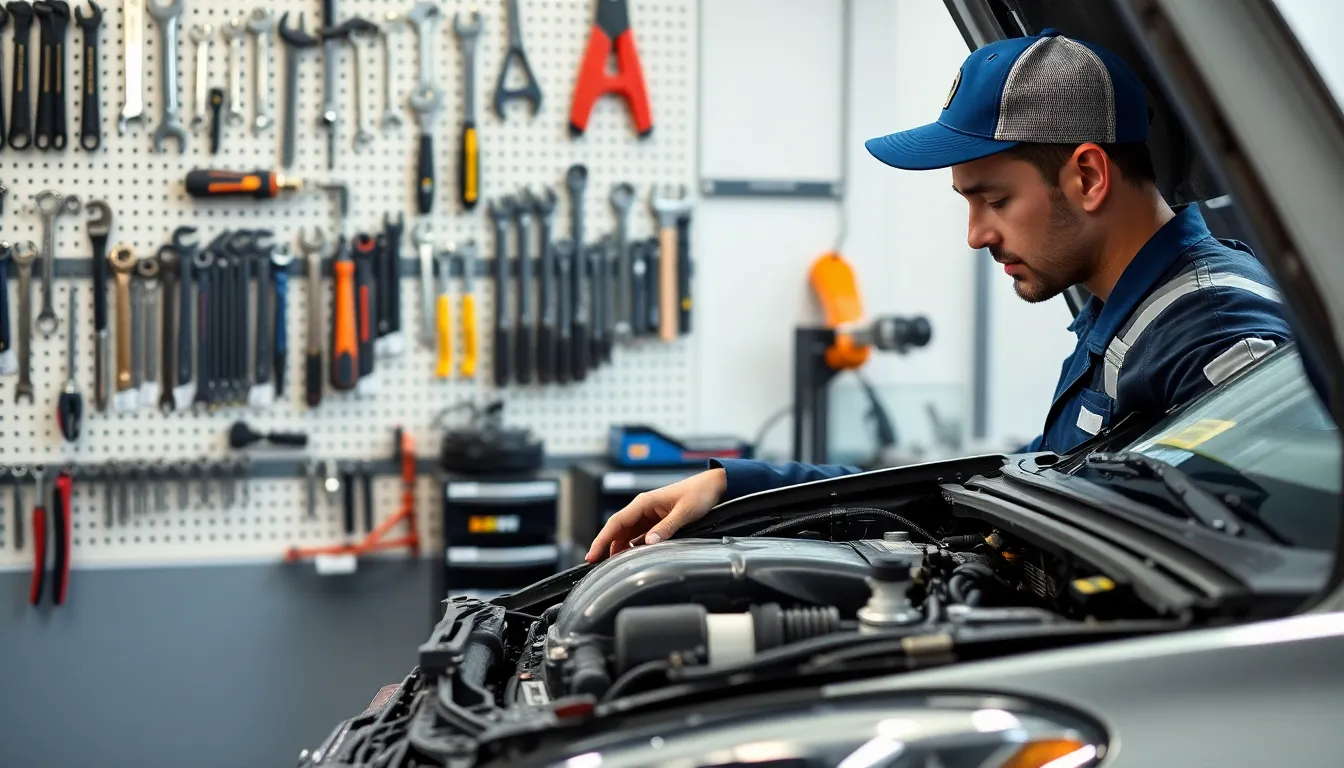Table of Contents
ToggleIn the world of automotive repair, having the right tools can make or break a job. Imagine trying to fix a stubborn engine with nothing but a butter knife and a prayer. Not the best scenario, right? An organized automotive workshop tools list is your ticket to efficiency, ensuring you’ve got everything from wrenches to torque gauges at your fingertips.
Importance Of Having The Right Tools
Having the right tools in an automotive workshop directly impacts repair quality and efficiency. Mechanics achieve better results when they work with equipment specifically designed for each task. Without appropriate tools, frustration and time loss often increase, leading to errors and potential damage. An effective tools list simplifies organization and guarantees readiness for various projects.
Specific tools cater to different aspects of automotive repair. Wrenches, for instance, are essential for loosening and tightening nuts and bolts. Diagnostic tools identify issues quickly, reducing downtime on repairs. The right socket sets allow for efficient access to hard-to-reach areas, enhancing overall productivity.
Choosing high-quality tools ensures longevity and reliability. Durable tools withstand frequent use and maintain performance over time. In contrast, subpar tools may lead to accidents or additional repairs, increasing overall costs.
Efficiency rises when mechanics clearly understand which tools are necessary for specific jobs. An organized workshop reduces the time spent searching for the right tool, allowing mechanics to focus on repairs. Comprehensive training on tool usage further enhances skill and confidence, leading to better outcomes.
Investing in a well-rounded tools list also reflects professionalism. Clients appreciate knowing their vehicles are serviced with the best equipment available. When mechanics utilize appropriate tools, customer satisfaction increases, resulting in repeat business and referrals.
Essential Automotive Workshop Tools

An automotive workshop relies on various essential tools to ensure effective repairs. Each category of tools serves a distinct purpose, contributing to overall efficiency and quality of work.
Hand Tools
Hand tools play a crucial role in any workshop setting. These tools include wrenches, screwdrivers, pliers, and sockets. Wrenches handle nuts and bolts with precision, making adjustments smooth. Screwdrivers come in different sizes and types, which allows for versatility in accessing various components. Pliers grip and bend materials easily, providing control during tasks. Sockets, with their compatibility for ratchets, help mechanics tackle stubborn fasteners. Quality hand tools enhance grip and durability, reducing the need for replacements and ensuring safety during operations.
Power Tools
Power tools significantly speed up tasks and improve efficiency. Common power tools in automotive workshops include impact wrenches, drills, and grinders. Impact wrenches provide high torque, making it easier to remove tight bolts. Drills assist in creating holes and setting fasteners quickly. Grinders refine rough edges and polish surfaces, proving essential in restoration projects. These tools often come with different attachments, further expanding their functionality. Investing in reliable power tools ensures mechanics can complete jobs efficiently with reduced physical strain.
Diagnostic Tools
Diagnostic tools are vital for quickly identifying issues within vehicles. Common tools include OBD-II scanners, multimeters, and compression testers. OBD-II scanners connect with a vehicle’s onboard computer, providing error codes that indicate problems. Multimeters measure electrical currents, ensuring electrical systems function properly. Compression testers evaluate engine health by measuring cylinder pressure. Each of these tools delivers swift diagnostics, allowing for informed decision-making in repairs. Regular use of diagnostic tools minimizes downtime and increases customer satisfaction through accurate service.
Specialized Tools For Specific Tasks
Specialized tools enhance efficiency and precision in various automotive repair tasks. Understanding the specific functions of these tools ensures mechanics achieve optimal results.
Engine Repair Tools
Engine repair requires specific tools tailored for precision. Specialty wrenches and torque tools help in tightening bolts to manufacturer specifications. Cylinder hones allow for proper surface finishing of cylinders, ensuring effective compression. Compression testers assist in diagnosing cylinder health by measuring pressure accurately. Mechanics often utilize valve spring compressors for replacing springs without complete disassembly. These tools collectively streamline engine repair and minimize errors.
Brake Service Tools
Brake service demands tools designed for safety and efficiency. Brake bleeders allow for air removal from brake lines, ensuring a responsive brake system. Rotor grinders enable smooth surface finishes, which improve brake pad contact. Tools like caliper tool sets simplify the replacement of disc brake pads, facilitating transit efficiency. Additionally, hydraulic brake jacks lift vehicles securely for brake inspections. Utilizing these specialized tools minimizes service time and enhances overall brake performance.
Suspension Tools
Suspension work involves tools that ensure safety and reliability. Spring compressors aid in removing and installing coil springs without risk of injury. Shock absorber tools facilitate the replacement of shocks, enhancing ride quality. Alignment tools, such as camber gauges, help in achieving correct suspension geometry. Bushings and ball joint presses permit efficient replacement of worn components. Together, these tools empower mechanics to restore suspension systems effectively, maintaining vehicle stability.
Organizing Your Tools Efficiently
Organizing tools efficiently boosts productivity and reduces time spent searching for items. Clear storage solutions and effective inventory management are essential for every automotive workshop.
Tool Storage Solutions
Utilizing tool storage solutions keeps your workspace neat and accessible. Drawer organizers and tool chests offer mechanics easy access to hand tools, while shelving units can store power tools and larger equipment. Employing pegboards provides visibility for frequently used items, allowing for quick retrieval. Creating designated spaces for each tool type minimizes clutter and helps maintain order. Regularly evaluating storage options ensures that tools remain easy to find and properly maintained.
Inventory Management
Implementing proper inventory management practices simplifies tool tracking and maintenance. Using spreadsheets or specialized software helps record tool usage, condition, and location. Establishing a checklist for regular inventory audits ensures tools remain in good working order and identifies when replacements are necessary. Marking tools with names or unique identifiers enhances accountability and reduces losses. Keeping an updated inventory not only streamlines operations but also prolongs the lifespan of equipment by ensuring timely maintenance.
Having a comprehensive automotive workshop tools list is crucial for any mechanic aiming for efficiency and quality in repairs. The right tools not only enhance performance but also ensure safety and reliability in every task. An organized workspace, paired with high-quality equipment, fosters a productive environment that leads to satisfied customers and repeat business.
Investing in specialized tools for specific tasks can further improve precision and speed, reducing downtime and enhancing overall service quality. By implementing effective inventory management and tool organization strategies, automotive workshops can streamline operations and maintain a competitive edge in the industry. Embracing these practices will ultimately lead to better outcomes for both mechanics and their clients.





